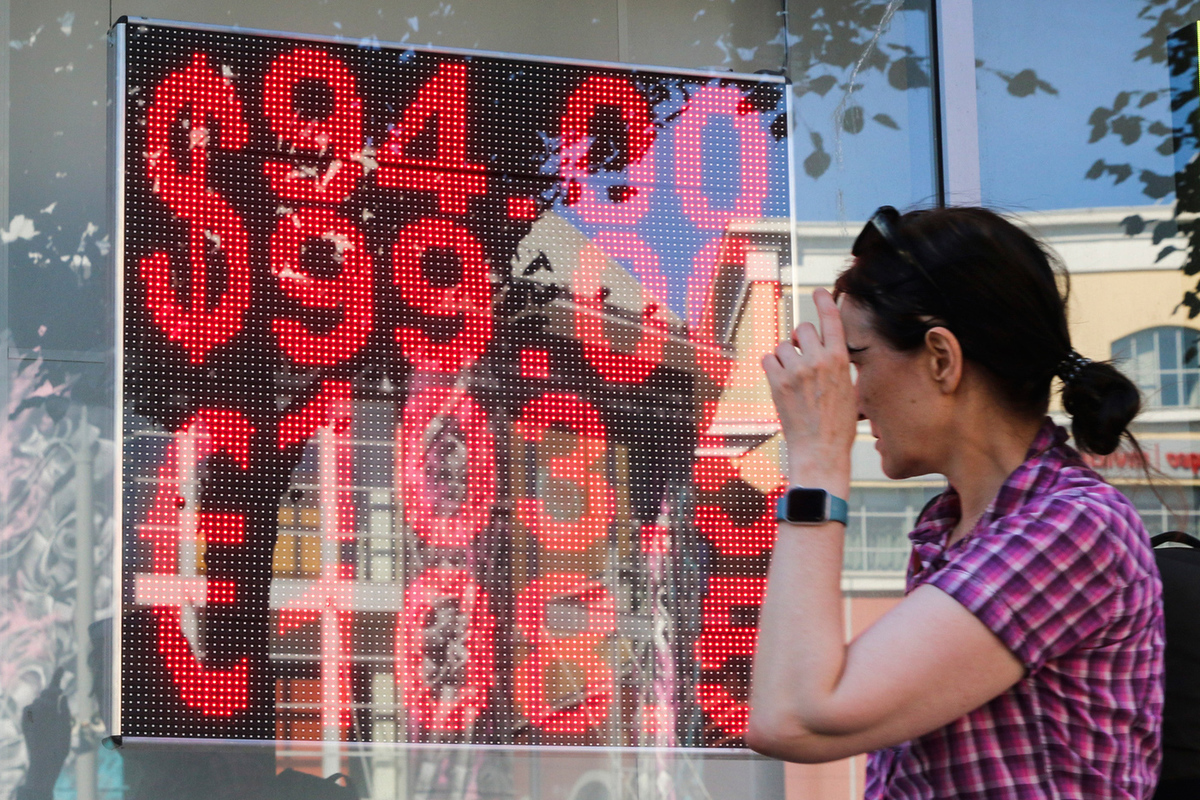The ruble will experience a mild devaluation: experts predicted the exchange rate for April
[ad_1]

Over the next month and a half, the ruble faces several conditional barriers. One such milestone – the presidential elections – has been passed. New “obstacles” are on the way: this is the Central Bank meeting on the key rate on March 22, and the approval of the new government, and the expiration of the decree on the mandatory sale of foreign currency earnings by exporters. Trying to predict the dynamics of the exchange rate now is a thankless undertaking, since unpredictable and force majeure circumstances may interfere with this “running” with previously known “obstacles”.
More precisely, this kind of thing is already happening. A completely new factor for the foreign exchange market was the massive attacks of Ukrainian drones on oil refineries in the Russian Federation. Apparently, partly for this reason, the ruble fell on the stock exchange against the US dollar and euro on Friday to its lowest level in several weeks. Well, on the morning of Monday, March 18, when the preliminary election results became known, the Russian currency won back 36.5 kopecks from the “American”. It seems that there will be no sharp weakening of the ruble in the near future. And then, according to experts interviewed by MK, a scenario of mild but steady devaluation is very likely.
“I think that two of the planned events will not affect the ruble exchange rate in any way,” says Igor Nikolaev, chief researcher at the Institute of Economics of the Russian Academy of Sciences. – Firstly, with a high degree of probability, the Central Bank will not change the key rate, keeping it at 16% per annum. Secondly, the authorities will almost certainly leave in force the requirement for exporters to sell foreign currency earnings. Despite the position of the Central Bank, which sees no point in extending this administrative measure. As for the increasing frequency of drone attacks on Russian refineries, the consequences for the foreign exchange market are difficult to predict and not obvious.”
A weakening of the ruble is possible, but not right now, but with a certain time lag. After all, the economic prerequisites for devaluation are too serious not to manifest themselves in the end. Thus, notes MK’s interlocutor, in January the Bank of Russia revised the estimate of the trade balance surplus in January from $9.7 billion to $7.8 billion – due to a decrease in exports and an increase in imports. That is, the key indicator for the exchange rate with which the economy entered the new year turned out to be far from the most optimistic.
“We shouldn’t expect any collapses in the coming weeks, but in general the situation in the economy is not in favor of the domestic currency,” Nikolaev argues. – Sanction pressure remains, moreover, the European Union recently adopted a new package. Plus, in January-February, the federal budget deficit amounted to 1.47 trillion rubles (0.8% of GDP), coming very close to the limit for the entire 2024 – 1.6 trillion rubles. Accordingly, the government needs to find money right now (the progressive tax scale will start working only in 2025), and the most obvious solution is to weaken the ruble.”
Now they are asking 92.54 rubles for a dollar, 100.82 rubles for a euro, notes Artem Deev, head of the analytical department at AMarkets. According to him, the rate will remain stable for no more than a week or two after the elections, and then world currencies will consolidate in the following corridor: 95 per dollar and 102 per euro. In April, the Central Bank will most likely move on to easing monetary policy, which means that pro-inflationary risks, which are the main factor for exchange rate dynamics, will intensify, pushing it down.
“As for attacks on refineries, this could become a significant problem for the Russian economy,” says Deev. “After all, against the backdrop of increasing demand for oil, which OPEC and IEA analysts predict, our treasury will be filled largely due to the export of hydrocarbons. Partial or complete decommissioning of capacities is fraught with the fact that the budget will receive less revenue, and a fuel shortage will arise in the domestic market.”
It is unlikely that the results of the presidential elections had a serious impact on the ruble exchange rate, which is formed primarily by the balance of demand and supply of currency, notes Fedor Naumov, chief strategist of PFL Advisors. The expert admits that the authorities will extend the validity of the decree on the mandatory sale of foreign currency earnings, since the measure has justified itself. This decision is supported by the fact that recently the list of major exporters providing information about their assets and liabilities to the Central Bank was expanded. As for the story with drones, these attacks do not have a direct impact on the exchange rate, and it is difficult to assess the indirect impact.
“Even if oil refining stops in the west of the country, we will sell crude oil,” Naumov summarizes. – Losses for trade and foreign currency inflow through the export channel will be small. And to satisfy the demand of the domestic market, refineries located in the eastern regions will be enough. That is, it is unlikely to be necessary to purchase petroleum products, increasing the outflow of foreign currency.”
[ad_2]
Source link






